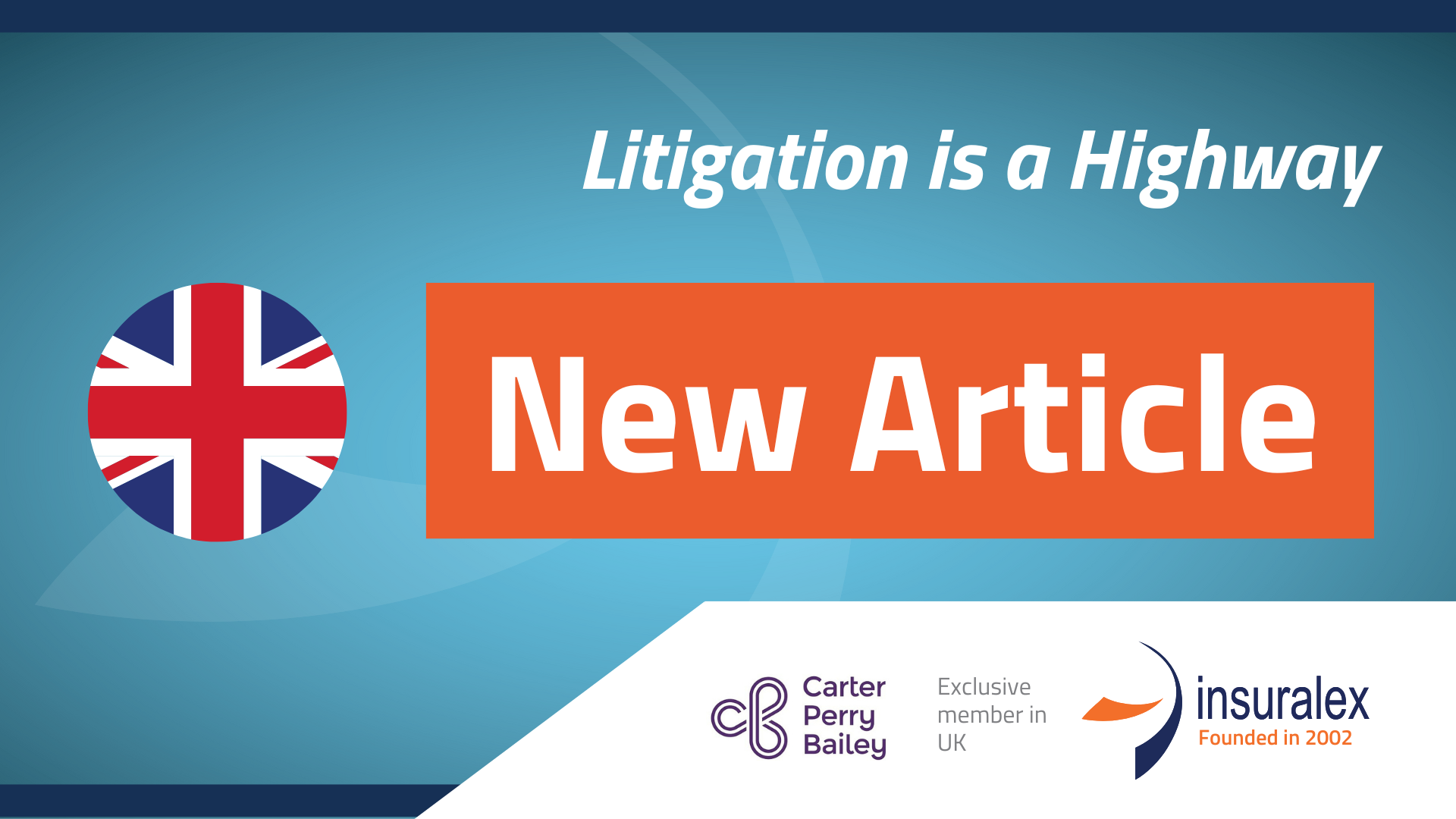
A recent County Court judgment, in which CPB represented the successful defendant, stands as a cautionary tale on the importance of proper claims management when engaging in litigation.
The defendant successfully applied to have the claim struck out when the claimant, Markerstudy Insurance Services Limited (“Markerstudy”), failed not only to establish a viable claim, but also to satisfy the Court that it had any standing at all to bring the claim in the first place.
At its heart is the important distinction between insurance companies and intermediaries such as managing general agents (“MGAs”). Whilst agents often act for insurers both at the underwriting phase and subsequently conduct claims management, they are not insurers, and should not assert to the insured consumer that they are.
Background
The claim arose from a motor policy (“the Policy”) between the defendant, Mr H, and Markerstudy Insurance Company Limited (“MICL”), which was, at the time the policy was entered into, Markerstudy’s Gibraltar based sister company. The Policy, arranged by Mr H’s broker through Markerstudy as MICL’s MGA, contained an endorsement restricting the permitted annual mileage to 8,000.
In 2019, Mr H’s wife (who was an insured driver) was involved in an accident for which she maintained firmly she was not at fault. A claim was notified to Markerstudy as required under the Policy, but cover was declined as the mileage endorsement had been breached. Markerstudy accordingly notified Mr H that MICL would “deal with the claim” by the other driver pursuant to its obligations under s.151 Road Traffic Act 1988 (“RTA”). This in broad terms, requires insurers to settle judgments obtained by third parties against negligent drivers, even if the insurer is able to avoid or cancel cover.
Mr H heard nothing more at all for some 3 years until shortly before Christmas 2022 when he received a letter from Markerstudy demanding payment within 21 days of over £100,000 as the amount purportedly paid by it to the other driver in settlement of their claim under s.151 of the RTA.
This was, understandably, a shock to Mr H. With nothing on how or why such a large amount had been paid by Markerstudy seemingly without a judgment against it, following an accident for which Mr H believed his wife was not at fault, Mr H wrote to Markerstudy, asking for further basic information.
Markerstudy promptly instructed solicitors. Mr H, who had by that point realised Markerstudy might not be his insurer, asked them to clarify which entity they acted for. Rather than doing so, they promptly issued proceedings in the name of Markerstudy, without any further notice.
Following service, Mr H instructed CPB. Despite raising the issue again, Markerstudy’s solicitors said they were satisfied that Markerstudy, the MGA, had locus standi, recording even in the Particulars of Claim that:-
i. “The Claimant is, and was, at material times, an insurance company […]
ii. The Defendant was a policyholder who entered into a contract of insurance with the Claimant”.
This was not in fact true, as Markerstudy was an MGA for the insurer, not the insurer itself. Mr H served his Defence, challenging Markerstudy’s right to sue. Markerstudy remained steadfast and made clear that if Mr H was so confident, he should pursue his threatened Draconian remedy of applying to strike out the claim. Mr H duly did so.
The Proper Claimant
The application to strike out was made just before Christmas 2023 and listed to be heard almost a year later.
Markerstudy’s response was prompt. On 10 January 2024, they applied to substitute MICL for Markerstudy, thereby conceding that Mr H was correct as to the proper claimant. In support of its application, Markerstudy relied on a “Permission Pursuant to CPR 19.4(4)”, which purported to evidence MICL’s consent, but which gave a UK registered office address when MICL is a Gibraltar based company, and appeared to be signed by a Markerstudy Group team member, even though MICL was no longer part of the Markerstudy Group.
This consent by MICL therefore raised more questions than it answered. Mr H queried the authority of the signatory.
Further, while the amendment sought to substitute the name of the claimant, this meant that positive statements made as to actions taken by Markerstudy in the original Particulars were directly contradicted. Notably, this meant that the claimant moved from saying that the claim had been paid by Markerstudy to saying that this had in fact been paid by MICL. There was no clear explanation as to how an incorrect statement of case came to be verified by a Statement of Truth in the first place.
The Judgment
· “Inherent probabilities”
At the Hearing, HHJ Duddridge acknowledged the claimant’s submission that as a matter of inherent probabilities, it was unlikely that a person would sign a document on behalf of a company if she did not believe herself to be authorised to do so. Equally, it was unlikely that the solicitors would hold themselves out to act on behalf of a company if they did not in fact have instructions.
However, the Judge found that it was insufficient to rely on “inherent probabilities”. In reaching this view, he emphasised the factual evidence to the contrary that Mr H had produced, whilst remarking it would have been the easiest thing for the claimant’s solicitors to produce evidence of the identity of those instructing them. In those circumstances, it was not satisfactory to fall back on inherent probabilities alone.
The Judge then turned to consider how to deal with the claim, brought both in contract and pursuant to s.151 (7) and (8) of the RTA.
· “the contractual claim”
The Judge took the view that any claim in contract would fail, as the claimant had not established the requisite causation. It was not clear that the insurers’ liability arose as a result of the purported breach of contract, particularly seeing that the duty upon insurers to make payment to an innocent third party in accordance with s.151 RTA was positively contemplated within the contract. The Judge further noted that the likely cause of events, had Mr H been mindful of the mileage limitation, was not that he would have abstained from driving the car altogether, but rather that he would have arranged to extend the permitted mileage.
· “the RTA”
Section 151(5) of the RTA requires insurers to pay awarded damages to the person entitled to the benefits of a judgment for liability following a road traffic accident, notwithstanding that the insurer may be entitled to avoid or cancel. In turn, an insurer making payment pursuant to s.151(5), is entitled to recover funds paid from the liable policyholder or wrongdoer. The provision is clear in its wording that it applies when a judgment against the policyholder has been obtained. Since Markerstudy did not rely on having settled a judgment (it still being unclear who had actually paid the third party and why) the Judge concluded a claim under s.151 was unlikely to even get off the ground.
Observing that the claim would have required significant amendment even to establish any viable prospect of success, HHJ Duddridge ordered the claim be struck out with indemnity costs.
Mr H was represented by Michael Harper of Crown Office Chambers at the hearing.
A transcript of the judgment is available at this link.
Insuralex UK (CPB) Comment
As the Judge noted, this was a very unusual case. The proceedings had been brought by the wrong company, and the situation exacerbated by the claimant’s failure to adapt to and navigate the landscape of the case as it changed throughout the process.
Markerstudy was ordered to pay indemnity costs summarily assessed at c. 90% of the costs incurred by the defendant. Whilst costs is an obvious concern for insurers (and their agents) there are also other concerns which insurers should always bear in mind, such as regulatory and ethical standards to which financial service providers must adhere. By way of example, in these proceedings, waters were muddied as to Markerstudy’s status – a consumer might well believe it is an insurer when it
pleads that is what it is. Care must be taken, especially in dealing with consumers, to ensure that regulatory obligations are adhered to. Conduct of the nature exhibited in this case may invite regulatory scrutiny and damage to reputation.
February 2025
Any questions
If you have any questions regarding the insurance-related issues highlighted in this article, please get in touch with Bernadette or Lisbeth.
You can review a range of articles on similar insurance and reinsurance related topics in the Publications section of our website.
If you did not receive this article by email directly from us and would like to appear on our mailing list please email tracy.bailey@cpblaw.com

Bernadette BaileyPartner |

Lisbeth PoulsenSolicitor / European Qualified Lawyer |



